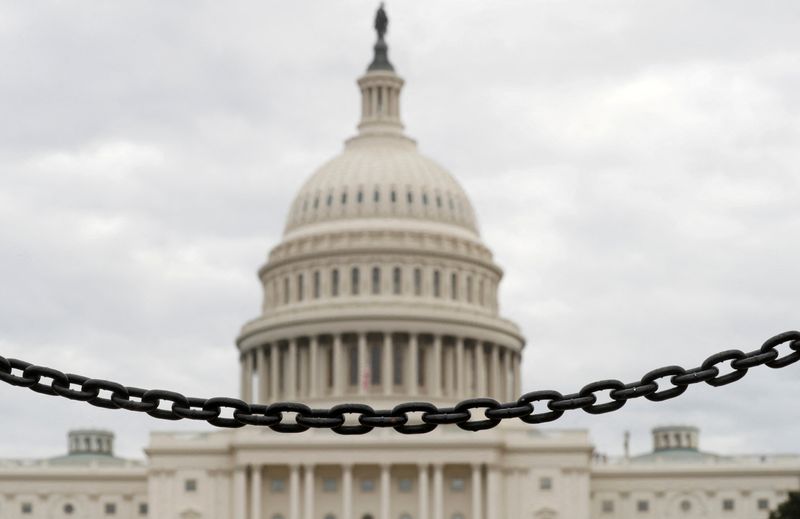(Reuters) - Republicans who control the U.S. House of Representatives say any increase in the United States' $31.4 trillion debt ceiling should be paired with spending cuts, but so far are not unified on any specific demands.
Here are a few proposals Republicans had floated.
LIMITED DISCRETION
The Republican Study Committee, a group of 165 conservative House Republicans, in an open letter on Wednesday laid out a series of proposals which included imposing legal limits on some discretionary spending and easing regulations on domestic energy production. The group's proposals contained few specifics.
NO CUTS TO SOCIAL SECURITY AND MEDICARE
McCarthy has said that Republicans will not try to scale back the two largest benefit programs: Social Security, which provides payments to retirees and the disabled; and Medicare, the health insurance program for seniors.
That is a shift from previous budget negotiations, when Republicans suggested raising the retirement age and partially privatizing Medicare.
It also places almost one-third of the budget off limits. Social Security accounted for 17% of federal spending in the 2021 fiscal year, while Medicare accounted for 13%, according to the nonpartisan Congressional Budget Office.
DO NOT CUT DEFENSE
Republicans have traditionally supported robust military spending, and some House lawmakers including Kay Granger and Tom Cole, the heads of the powerful Appropriations and Rules committees, have said that defense cuts should be off the table. That would leave another 11% of the federal budget off limits.
ROLL BACK SPENDING TO 2022
McCarthy has proposed capping annual "discretionary" spending on agencies such as the Defense Department and the Food and Drug Administration at the levels that were in place in the fiscal year that ended Sept. 30, 2022: $782 billion for defense, and $689 billion for domestic programs.
That would amount to a cut of 9% for defense and 7% percent for non-defense programs from the levels in place now, according to CBO estimates. Those cuts would broaden in the years to come as spending would not keep pace with inflation, population growth or the size of the economy.
These cuts would not apply to benefit programs, like federal workers' pensions and unemployment insurance.
DEEPER CUTS FOR DOMESTIC SPENDING
Chip Roy, a leader of the far-right House Freedom Caucus, has called for keeping defense spending at current levels and cutting non-defense spending to $661 billion, the level in place in the 2019 fiscal year.
As with McCarthy's proposal, that would effectively amount to deeper cuts in the years to come.
HOLD SPENDING IN LINE WITH INFLATION
Don Bacon, a moderate Republican, has called for keeping spending growth in line with inflation, rather than pushing for cuts that likely will not win support in the Democratic-controlled Senate.
TIE IT TO THE ECONOMY
Brian Fitzpatrick, another moderate, advocates a bipartisan proposal that would change the debt ceiling from a fixed dollar amount to a percentage of national output. That would force budget cuts if federal borrowing exceeded a set share of the economy, but he has not said what that limit should be. Washington's debts are currently equivalent to about 125% of one year of production across the U.S. economy.
ANNUAL REDUCTIONS
Nancy Mace, another moderate, has called for the government to reduce its spending by a certain percentage every year, though she has not provided details.
PAY SOME DEBTS, BUT NOT OTHERS
Some conservatives have said that the Treasury Department could "prioritize" some payments over others when the debt limit is reached. Under this idea, Treasury would make interest payments to bondholders to avoid roiling financial markets, and perhaps pay the salaries of the military but not civilian federal workers.
Treasury could have the technical ability to pay bondholders before others, as it uses a separate computer system for that task. But it would create huge political problems. Democrats are already saying that Republicans who back this plan favor foreign investors over American retirees and others who depend on benefit payments.
RAISE THE DEBT CEILING WITH NO CUTS
This option, favored by Biden and his Democrats, has backing from some Republicans like Patrick McHenry, who chairs the Financial Services Committee.
In December, he said he believes that serious discussions about cutting spending are needed but he opposed having those talks in the context of the debt limit debate.

NO DEBT CEILING INCREASE AT ALL
Some hardliners, such as Tim Burchett and Andy Biggs, have said they will vote against raising the debt ceiling, no matter what provisions are attached. That could make it difficult for McCarthy to round up support for any compromise that can win support from Biden and the Democratic-controlled Senate.